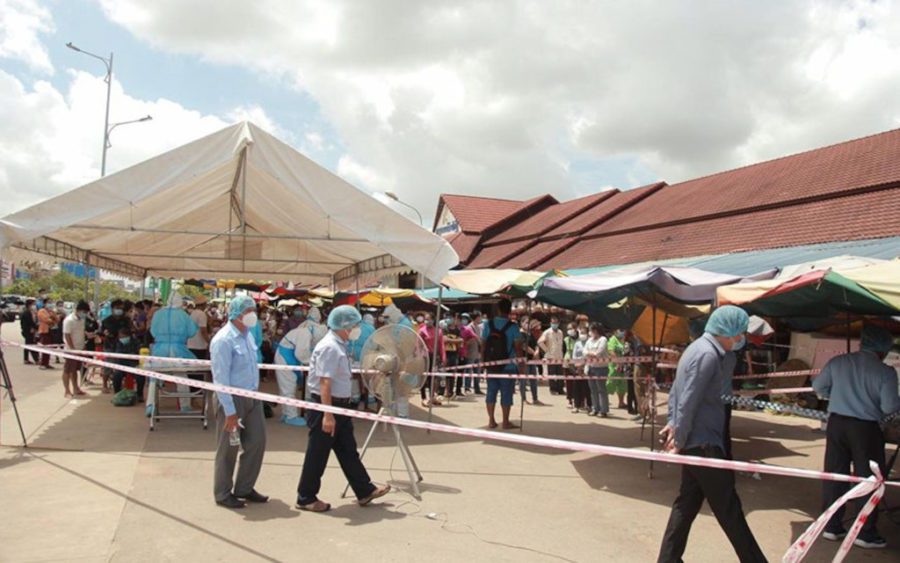Migrant workers at a quarantine center in Siem Reap province are unhappy being placed with Covid-19 patients at the same facility, with one worker saying he has not been released from the center for two months despite testing negative.
Workers returning from Thailand, which has been hit with a surge in Covid-19 cases, have to quarantine at centers and makeshift facilities at schools for at least 14 days before returning to their homes. At least 15,000 workers have returned since August 22, according to the International Organization for Migration, with 100,000 expected in the next six months.
VOD spoke to workers at Siem Reap’s Tea Banh Kum Rou primary school in Puok district who say they are placed alongside Covid-19 patients, sharing bathrooms and made to stay beyond the mandated quarantine period.
Hean Seab returned from Thailand and wants to go back to Pursat province. He was sent to the primary school with 400 other workers in early July and has since been stuck there despite testing negative for the virus, he said this week. A hundred workers are still waiting to get back home, Seab said, adding that more than 150 people at the center had been infected with the virus.
He said this was because workers in quarantine were sharing space with active Covid-19 cases.
“They infected one another,” Seab said. “[I was tested] three, four or five times! We are not positive! And we are not allowed to go to our provinces.”
He said 100 people were in a similar position to him, and blamed the sharing of facilities and lax care from officials and medical staff.
Khat Vutha seemed to agree with Seab. She tested positive for the viral disease after reaching the quarantine center and thinks she got the virus after sharing bathrooms with a few Covid-19 patients. Doctors haven’t given her enough attention, Vutha said, and she has requested officials let her return and recover from home.
“I want to go back to the province. Here, I have never had a full meal. In our province, it is easier and I can call my parents to send me some food.”
A U.N. note on migrant workers in June reported that more than 200,000 workers had returned home from neighboring countries, many facing economic hardships. A survey found that 30 percent of workers had no income, 50 percent had debts and 49 percent had problems accessing health care.
Additionally, the U.N. said resources had been allocated to quarantine centers to address potential mental health issues faced by workers facing stressful journeys home.
Lam Srey Oun, the director of the makeshift quarantine center at the school, acknowledged that there were Covid-19 positive people at the center. She said that previously there were only a few migrant workers at the center, but officials decided to bring in people who were already living in Cambodia to the facility. She did not say if these people were Covid-19 positive.
“We put those from the community to one side and the workers to one side,” Srey Oun said.
“We did testing on rotation. When we tested [people from] the community, the [workers] said we were biased and got angry because I put community people to one side near them.”
Srey Oun said there were around 400 people at the center but that officials could only do a limited number of tests a day, and that her policy of “rotation testing” was as per guidelines.
Ouch Vuthy, the president of the Cambodian Virtuous Doctors Association, said he had monitored the case and suggested that people not blame the doctors. Instead, they should inform senior doctors or the authorities if they felt treatment and health care standards were not being met.
“We have to be tolerant of the doctors. I see that they work hard and one of them takes care of 30 or 100 patients. At this point, people should be understanding and join hands.”
Vuthy said that if the doctors and people do not cooperate to prevent Covid-19, the risk of increased transmission, especially of new variants, will spread further into the community and it will become harder to control.
Oeut Sras, another returned migrant at the Tea Banh Kum Rou school, said that patients, workers and others from the area were being kept separate, but if new patients kept coming in there was the chance of transmission within the facility.
She added, “We have not been able to go home yet and the patients keep coming in. I am afraid of getting infected. I just want to recover soon and go home because I do not want to be here.”
The Health Ministry has reported a total of 93,510 cases of Covid-19 as of Wednesday, and 1,916 deaths.













